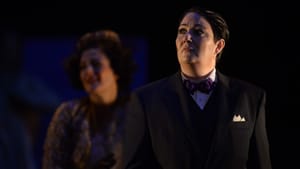Stay in the Loop
BSR publishes on a weekly schedule, with an email newsletter every Wednesday and Thursday morning. There’s no paywall, and subscribing is always free.
A life of frustrated love
Opera Philadelphia's 'Ainadamar'

Spanish poet and playwright Federico García Lorca is an ideal character for a musical play. He was an Andalusian who loved bullfighting, played the guitar, and sang gypsy songs. He had a charismatic personality as he championed the cause of working people and especially of women — and his support of the Spanish Republic led to his 1936 execution by the Nationalists in the Spanish Civil War.
And of course, he was a poet who fused musical elements into his writing. Once he compared the crescent moon to a fermata, a held note, interrupting the harmony of the night.
But the Lorca in David Henry Hwang’s libretto for Ainadamar does not display those qualities. Instead, he is an idealized, almost Christ-like figure. Writing his role for a woman singer also seems like a way of avoiding Lorca’s sexuality.
"All his poetry turns around frustrated love,” wrote Lorca’s biographer Ian Gibson, and “his tormented characters who can't live the life they want.” Homophobia existed in Spain on both sides in the civil war and afterward, and Lorca’s family did not want the subject to be discussed. It’s a shame that in the 21st century Hwang still felt the topic to be off-limits, and he ignores that aspect of Lorca’s personality. British screenwriter Philippa Goslett says that Lorca had a relationship with his scenic designer, Salvador Dalí, and as a substitute for completing their union, Lorca slept with a female friend, with Dali observing. Now that’s further than I’d want this, or any opera, to go — but I do wish Hwang had been less ethereal in his approach.
The action of the opera takes place in the final moments of the life of actress Margarita Xirgu, Lorca’s muse, who starred in several of his plays. She stands in the wings in a theater in Uruguay, about to perform Lorca's Mariana Pineda, many years after the playwright’s death. (Pineda was a 19th-century Spanish heroine who also was killed for her political ideals.) Lorca’s life is recalled in flashbacks by the actress. Unfortunately, Hwang failed to show what chemistry drew Lorca and Xirgu together; the audience is just asked to accept that there’s a personal bond, and that Xirgu became his disciple.
A potent mix
Osvaldo Golijov’s music reflects his own mix of Eastern-European Jewish, Latin-American, and gypsy heritages, and perfectly suits the history of the Iberian peninsula, where Catholic, Jewish, and Muslim cultures intermixed productively in the Middle Ages. Golijov’s music also conjures relevance to today’s problems in the Middle East.
His orchestra includes guitars and exotic percussion, and players in the pit contribute hand-clapping. In addition, Golijov unfurls percussive stage business and audio effects. Echoes of gurgling water and galloping hoofbeats are transformed into heel-clicking rhythms. When Lorca and two other prisoners are executed, gunshots repeat in a flamenco pattern which segues into a soulful and primal canto.
Ainadamar (“Fountain of Tears” in Arabic), near Granada, is where the poet was executed by Franco’s Nationalists. The Santa Fe production, directed by Peter Sellars in 2005, emphasized the arid aspect of Depression-era Spain and showed a fountain in the middle of a dry courtyard. The terrain was parched and hard, reflected in colorful tiles painted by the artist known as Gronk. This new production emphasizes, instead, the fact that Granada is at the confluence of four rivers, and we see small boats bobbing on the water.
María Hinojoso Montenegro as Xirgu sounded darker and tougher than the sweeter-voiced originator of the role, Dawn Upshaw, yet she floated ethereal, soft high notes. Mezzo-soprano Marina Pardo in the trouser role of Lorca came across authentically. Soprano Sarah Shafer, as Xirgu’s protégé, displayed a bright soprano voice with a wide vibrato that occasionally overwhelmed the musical line.
Corrado Rovaris clearly loves this music and has conducted it at Curtis Institute and in Spain leading up to this sensitive reading.
For Naomi Orwin's essay on the ultimate meaning of art, which includes a consideration of Ainadamar, click here.
What, When, Where
Ainadamar. Music by Osvaldo Golijov. Libretto by David Henry Hwang. Conducted by Corrado Rovaris. Directed by Luis de Tavira. Choreography by Stella Arauzo. Opera Philadelphia at the Academy of Music, Broad and Locust Streets, Philadelphia. February 7 through 16, 2014. 215-893-1018 or www.operaphila.org.
Sign up for our newsletter
All of the week's new articles, all in one place. Sign up for the free weekly BSR newsletters, and don't miss a conversation.

 Steve Cohen
Steve Cohen